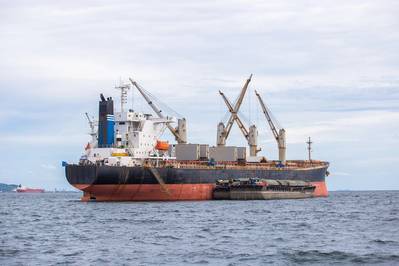The National Drug Law Enforcement Agency (NDLEA) on Friday, reaffirmed that drug trafficking through the sea has been a security problem for all countries of the region as it involved the movement of large quantity drugs.
The Director Seaport Operation, NDLEA, Omolade Faboyede who made this call in a goodwill message to mark the day with the theme, “Better Knowledge for Better Care”, NDLEA also calling on the maritime stakeholders to endeavor to give their workers and seafarers drug abuse education and treatment for affected staff.
Faboyede noted that the trafficking of narcotic drugs by sea had virtually become an industry comprised of many individual enterprises of varying size and organization adding that it was an attraction for major international criminal organizations and terrorist.
She added that commonly trafficked drugs include Cocaine, Heroin, Morphine, Cannabis Sativa and Crystal Methamphetamine even as she noted that drugs were trafficked by air, land and sea.
“Criminality in the Gulf of Guinea include maritime piracy, armed robbery, trans-organized crime such as illegal fishing and associated crime such as drug smuggling, human trafficking, money laundering, illegal dumping of toxic waste and other sea based crimes. Since mid-2000, West Africa has emerged a transit point for trafficking of Cocaine from South America to Europe.
” The United Nations Office on Drugs and Crime estimated that $1.25 billion worth of cocaine passed the region in 2010 alone. Recent drug trafficking has witnessed a massive movement of Cannabis Sativa from Ghana to Nigerian waters at an alarming rate.
“Over 90% of goods are transported globally by sea and constantly changing trading patterns between emerging and developing countries create new opportunities to shift goods.
“Drugs are sometimes transported via indirect routes as main routes become better policed; traffickers select countries with weak enforcement or corruptible officers. Drugs are usually concealed in bulk cargoes, containers, cargo of cars, freight vehicles, trailers or coaches, ship hull and speed boats.
“Smuggling of drugs is possible through vessel without the knowledge of the crew. It is also possible that port staff may be involved”, she said.
On the effect of drug abuse and illicit trafficking on the individual and the nation at large, she said, “Drugs are chemicals that affect the body and brain. Some effects of drugs include health consequences that are long lasting and permanent.
“They can continue after a person has stopped using drugs. Drugs can eventually change how the brain works and interfere with a person’s ability to make choices, leading to intense cravings and compulsive drug use. Over time the person becomes dependent or addicted.
“More than 7 million people suffer from illicit drug use disorder and one in four deaths can be attributed to alcohol, tobacco and illicit prescription of drugs.
“People suffering from drugs and alcohol addiction are victims of unintentional injuries, accidents and domestic violence. They are paranoia, aggressive, hallucinate, impulsive, loss of self-control and their judgments are impaired.
It increases the level of insecurity and drug related crimes. Nigeria must have the political will to tackle the issue of drug trafficking, the supervising agency; National Drug Law Enforcement Agency must be strengthen and adequately funded to combat drug abuse and trafficking in Nigeria.”
“The good news is that a drug user can be treated, rehabilitated and reintegrated into the society. The maritime stakeholders should endeavor to give their workers and seafarers drug abuse education and treatment for affected staff.
“Drug trafficking tarnishes the image of a country, impact negatively on the security, economy and the well-being of such country. It is a tool for terrorism financing, corruption inducement, political instability and undermines economic development.
She further observed that this celebration was a clarion call to all maritime stakeholders to support inter-agency cooperation, synergy, collaboration, sharing of intelligence and sharing of information to dismantle drug smuggling network in the region.
Meanwhile, the National Association of Government Approved Freight Forwarders (NAGAFF) has charged the National Drug Law Enforcement Agency (NDLEA) to endeavour to ensure more discipline among the rank and file of its officers as a paramilitary organisation.
NAGAFF made this charge in its goodwill message to NDLEA which turned 30 years recently, saying that though indiscipline is not at an alarming rate, but a “stitch in time saves nine.”
It added that it was its belief that NDLEA’s operations at the Ports should be intelligence-driven to avoid distressing compliant importers.
Noting that the NDLEA has achieved many feats that stemmed drug abuse and trafficking in the Country, NAGAFF however, advised that the Agency intensifies efforts towards currying the support of the Nigerian people it has committed itself to serve while also improving its Corporate Social Responsibility (CSR













